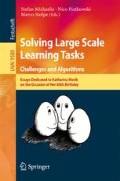Abstract
A number of recent works have designed algorithms that allow an agent to revise a relational action model from interactions with its environment and uses this model for building plans and better exploring its environment. This article addresses Multi Agent Relational Action Learning: it considers a community of agents, each rationally acting following some relational action model, and assumes that the observed effect of past actions that led an agent to revise its action model can be communicated to other agents of the community, potentially speeding up the on-line learning process of agents in the community. We describe and experiment a framework for collaborative relational action model revision where each agent is autonomous and benefits from past observations memorized by all agents of the community.
Access this chapter
Tax calculation will be finalised at checkout
Purchases are for personal use only
Notes
- 1.
MAS stands for Multi Agent System.
- 2.
A problem generator for the colored blocks world problem is available at http://lipn.univ-paris13.fr/~rodrigues/colam.
- 3.
- 4.
Except in the Rover domain where communication rules are assumed to be known by the agent.
References
Blockeel, H., De Raedt, L.: Top-down induction of first-order logical decision trees. Artif. Intell. 101(1–2), 285–297 (1998)
Bourgne, G., Bouthinon, D., El Fallah Seghrouchni, A., Soldano, H.: Collaborative concept learning: non individualistic vs. individualistic agents. In: Proceedings of ICTAI, pp. 549–556 (2009)
Bourgne, G., El Fallah-Seghrouchni, A., Soldano, H.: SMILE: sound multi-agent incremental learning. In: Proceedings of AAMAS, p. 38 (2007)
Croonenborghs, T., Ramon, J., Blockeel, H., Bruynooghe, M.: Online learning and exploiting relational models in reinforcement learning. In: Proceedings of IJCAI, pp. 726–731 (2007)
Dzeroski, S., De Raedt, L., Driessens, K.: Relational reinforcement learning. Mach. Learn. 43, 7–50 (2001)
Esposito, F., Ferilli, S., Fanizzi, N., Basile, T.M.A., Di Mauro, N.: Incremental learning and concept drift in inthelex. Intell. Data Anal. 8(3), 213–237 (2004)
Hoffmann, J.: FF: the fast-forward planning system. AI Mag. 22, 57–62 (2001)
Klingspor, V., Morik, K., Rieger, A.: Learning concepts from sensor data of a mobile robot. Mach. Learn. 23(2–3), 305–332 (1996)
Kulick, J., Toussaint, M., Lang, T., Lopes, M.: Active learning for teaching a robot grounded relational symbols. In: Proceedings of IJCAI (2013)
Lang, T., Toussaint, M., Kersting, K.: Exploration in relational domains for model-based reinforcement learning. JMLR 13, 3725–2768 (2012)
McDermott, D.: The 1998 AI planning systems competition. AI Mag. 21(2), 35–55 (2000)
Morik, K.: Sloppy modeling. In: Morik, Katharina (ed.) Knowledge Representation and Organization in Machine Learning. LNCS, vol. 347, pp. 107–134. Springer, Heidelberg (1989)
Mourão, K., Zettlemoyer, L.S., Petrick, R.P.A., Steedman, M.: Learning STRIPS operators from noisy and incomplete observations. In: Proceedings of UAI, pp. 614–623 (2012)
Otero, R.: Induction of the indirect effects of actions by monotonic methods. In: Kramer, S., Pfahringer, B. (eds.) ILP 2005. LNCS (LNAI), vol. 3625, pp. 279–294. Springer, Heidelberg (2005)
Pasula, H.M., Zettlemoyer, L.S., Kaelbling, L.: Learning symbolic models of stochastic domains. JAIR 29, 309–352 (2007)
Rodrigues, C., Gérard, P., Rouveirol, C., Soldano, H.: Incremental learning of relational action rules. In: Proceedings of ICMLA, pp. 451–458. IEEE Press (2010)
Rodrigues, C., Gérard, P., Rouveirol, C., Soldano, H.: Active learning of relational action models. In: Muggleton, S.H., Tamaddoni-Nezhad, A., Lisi, F.A. (eds.) ILP 2011. LNCS, vol. 7207, pp. 302–316. Springer, Heidelberg (2012)
Rodrigues, C., Soldano, H., Bourgne, G., Rouveirol, C.: A consistency based approach on action model learning in a community of agents. In: Proceedings of AAMAS, pp. 1557–1558 (2014)
Rodrigues, C., Soldano, H., Bourgne, G., Rouveirol, C.: Multi agent learning of relational action models. In: Proceedings of ECAI, pp. 1087–1088 (2014)
Sutton, R.S.: Dyna, an integrated architecture for learning, planning, and reacting. SIGART Bull. 2, 160–163 (1991)
Xu, J.Z., Laird, J.E.: Instance-based online learning of deterministic relational action models. In: Proceedings of AAAI (2010)
Yang, Q., Wu, K., Jiang, Y.: Learning action models from plan examples using weighted MAX-SAT. Artif. Intell. 171(2–3), 107–143 (2007)
Zhuo, H.H., Nguyen, T.A., Kambhampati, S.: Refining incomplete planning domain models through plan traces. In: Proceedings of IJCAI (2013)
Author information
Authors and Affiliations
Corresponding author
Editor information
Editors and Affiliations
Rights and permissions
Copyright information
© 2016 Springer International Publishing Switzerland
About this chapter
Cite this chapter
Rodrigues, C., Soldano, H., Bourgne, G., Rouveirol, C. (2016). Collaborative Online Learning of an Action Model. In: Michaelis, S., Piatkowski, N., Stolpe, M. (eds) Solving Large Scale Learning Tasks. Challenges and Algorithms. Lecture Notes in Computer Science(), vol 9580. Springer, Cham. https://doi.org/10.1007/978-3-319-41706-6_16
Download citation
DOI: https://doi.org/10.1007/978-3-319-41706-6_16
Published:
Publisher Name: Springer, Cham
Print ISBN: 978-3-319-41705-9
Online ISBN: 978-3-319-41706-6
eBook Packages: Computer ScienceComputer Science (R0)

